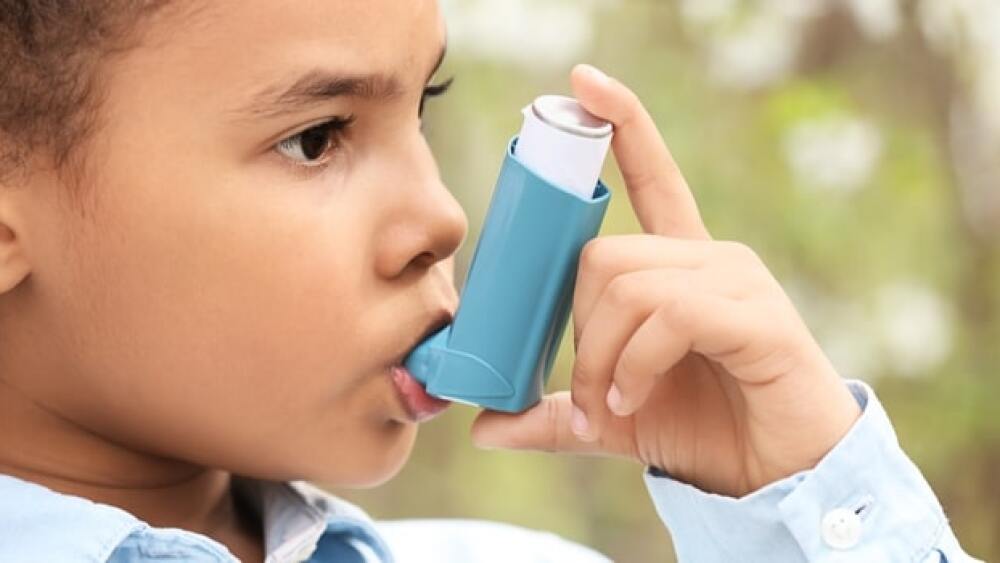New studies suggest that the virus may aggravate childhood asthma after infection. For that and more COVID-19 news, continue reading.
The research on COVID-19 and asthma has been fairly clear: people with moderate-to-severe or uncontrolled asthma are more likely to be hospitalized. New studies suggest that the virus may aggravate childhood asthma after infection. For that and more COVID-19 news, continue reading.
Childhood Asthma May Worsen After COVID-19 Infection
A study out of Children’s Health of Orange County, California, that looked at 62,000 children with asthma who were tested for COVID-19 in the first year of the pandemic found that children who had infections had significantly more asthma-related visits, hospitalizations, emergency inhaler use, and steroid treatments within six months of their illness. Of the 62,000 children studied, 7,700 tested positive. Dr. Christine Chou, M.D., of Children’s Health, said children who tested negative for the virus “had improved asthma control for the next six months, meaning fewer emergency department visits and hospitalizations for asthma, and less asthma treatment.”
3rd Shot of mRNA Vaccines May Not Boost Protection Against Omicron
A study out of Connecticut suggests that in people who were previously infected with SARS-CoV-2, a third shot of the mRNA vaccine from Pfizer-BioNTech or Moderna might not increase protection against the Omicron variant. The research team evaluated almost 130,000 people tested for COVID-19 in Connecticut from November 2021 through January 2022, including 10,676 identified with Omicron infections. About 6% to 8% had previously been infected with other variants. Two doses helped protect against Omicron, but “we did not detect an additional benefit of receiving a third booster dose among this population,” said Margaret Lind, Ph.D. of Yale University. The study has yet to be peer-reviewed.
A study from Canada, also yet to be peer-reviewed, found that more than two vaccine doses “may be of marginal incremental value” for protecting people against Omicron who had previously been infected.
Pfizer Indicates Paxlovid Can Be Taken Longer if Disease Relapses
Although Pfizer‘s antiviral treatment Paxlovid has been authorized for a five-day regimen, CEO Albert Bourla indicated that they could take more if patients relapsed after taking the full course. “Paxlovid does what it has to do: it reduces the viral load,” Bourla told Bloomberg. “Then your body is supposed to do the job.”
The National Institute of Allergy & Infectious Diseases is planning studies to determine how often and why SARS-CoV-2 levels may rebound in some COVID-19 patients who finished a five-day course of Paxlovid. “It is a priority,” said Clifford Lane, deputy director for clinical research at NIAID, adding it is “a pretty urgent thing for us to get a handle on.”
World Trade Organization Another Step Closer to a COVID-19 Vaccine I.P. Waiver
The World Trade Organization indicated it has prepared an “outcome document” after months of negotiations with the U.S., European Union, India and South Africa over an intellectual property waiver for COVID-19 vaccines. Although there appear to be still unresolved areas in the draft, the draft may have broader support after 18 months of stalled negotiations.
“What the discussions were aiming at was coming up with something workable,” WTO Director-General Ngozi Okonjo-Iweala told Reuters. She hopes the WTO’s 164 members will finalize and approve the proposal by June. “This will advance the discussion and dialogue. For the next pandemic or a flare-up of this one, this is hugely important.”
U.S. Tracking Omicron Subvariants BA.4 and BA.5
South Africa is currently seeing a spike in cases of two subvariants of Omicron, BA.4 and BA.5. This has U.S. public health officials on edge as they attempt to monitor cases here for those variants. In South Africa, according to the country’s National Institute of Communicable Diseases, they accounted for almost 60% of new COVID-19 cases by the end of April. They observe that the subvariant appears to evade antibodies from the previous infection well enough to cause a new wave but appears to do so much less often in vaccinated people.
“It looks that #COVID19 may be evolving differently and that we may not need a new variant to cause a new wave of infection,” tweeted Tulio de Oliveira, director of South Africa’s Centre for Epidemic Response and Innovation. “We are seeing this with BA.4 and 5 in S.A. and with BA2.12.1 on the east coast of the USA. We are all tired of this virus, but he may not be tired of us. We need now to take seriously the decreasing immunity from previous infections.”





